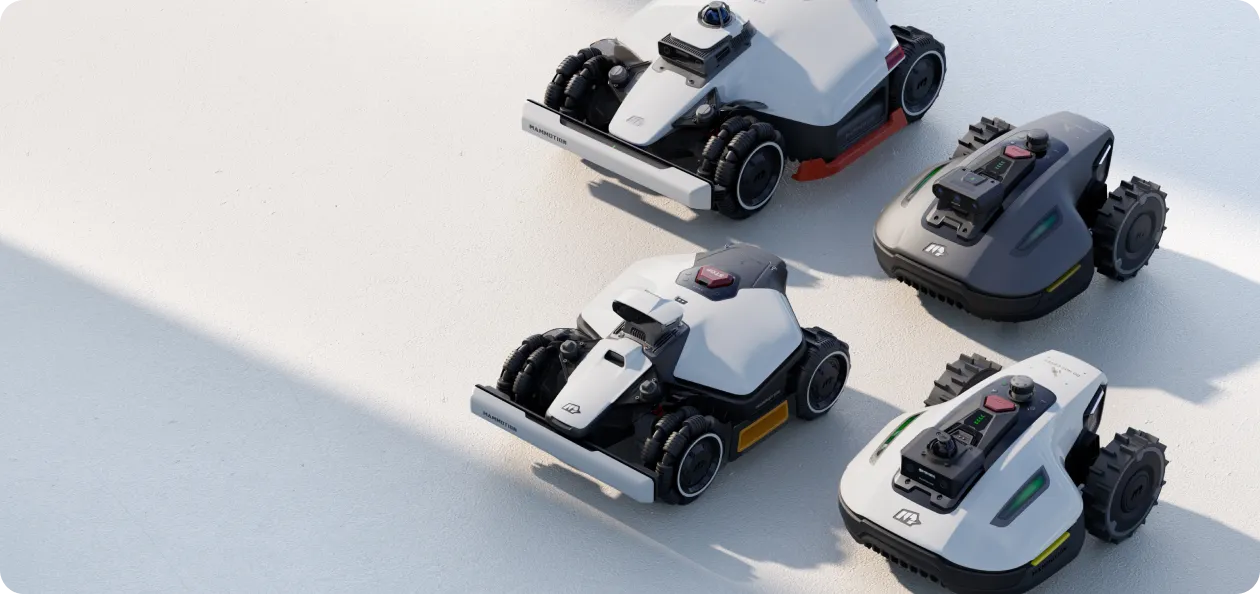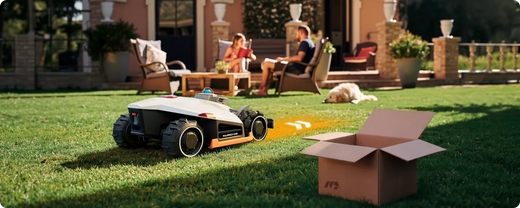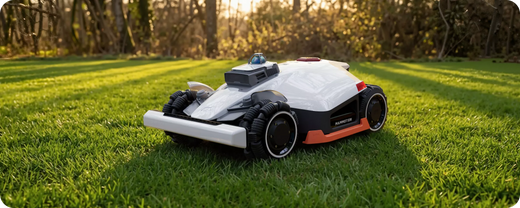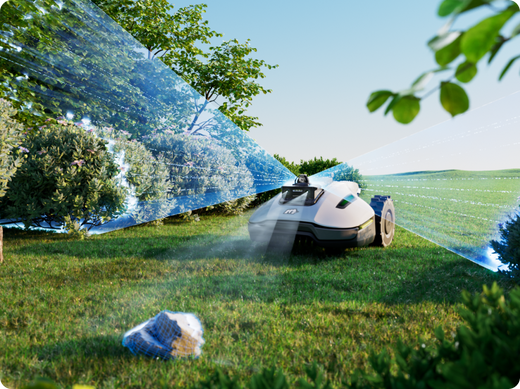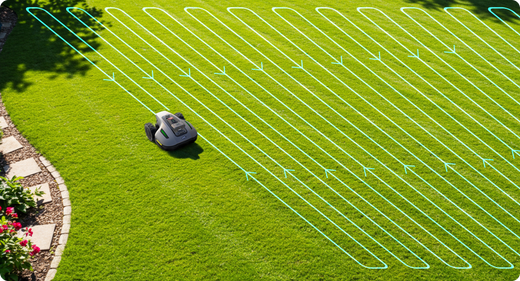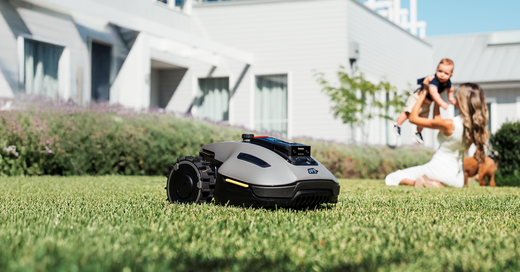Robot lawn mowers have grown rapidly in popularity over the past few years as homeowners look for ways to automate outdoor maintenance. With improved navigation, stronger cutting systems, and app-based controls, it’s easier than ever to hand off weekly mowing to a machine that quietly does the work for you.
Still, a robot lawn mower isn’t the perfect solution for every yard. Lawn layouts, terrain, maintenance expectations, and budget all affect whether a robotic mower will deliver the value you’re hoping for.
This guide breaks down the real pros and cons of robot lawn mowers, explains how they work, and helps you decide whether they’re the right choice for your home. Although we manufacture robotic mowers, this article is designed to give an honest, practical overview so you can make an informed decision.
How Robot Lawn Mowers Work
A robot lawn mower is an autonomous, battery-powered machine that trims your lawn automatically on a set schedule. Once it’s installed and configured, the mower navigates your yard using sensors, GPS, or boundary wires, making small, frequent cuts that keep grass healthy and even.
Navigation Systems
There are two primary types of navigation:
- Boundary-wire mowers use a low-voltage signal cable installed around the perimeter of the lawn. The mower stays within this loop and changes direction when it reaches the wire.
-
Wire-free or GPS-guided mowers use satellite navigation, AI vision systems, and sensors to map and manage the yard without physical boundaries. They can typically handle more complex layouts.
Cutting Method
Instead of removing large amounts of grass at once, robot mowers use small razor-like blades that trim a very small bit of grass during each pass. These micro-clippings fall back into the lawn and serve as natural fertilizer.
Maintenance Basics
Robot mowers require significantly less maintenance than gas-powered units. You will need to:
- Replace blades periodically
- Check the wheels and underbody for debris
- Keep the charging base clean
- Replace the battery after several years, depending on usage
Overall, the technology is designed to be low-touch once installed, but understanding how they operate helps set realistic expectations.
Pros of Robot Lawn Mowers: Unmatched Convenience and Performance
Robotic lawn mowers don’t just make lawn care easier—they transform it. Here are the key advantages of robot lawn mowers that make them a smart choice for modern homeowners:
1. Convenience and Time Savings
The biggest advantage—by far—is the convenience. A robot lawn mower frees you from the routine of weekly mowing, especially during the fast-growing spring and summer seasons.
Once scheduled, the mower works automatically, returning to its charging dock when needed and resuming when ready. For people with busy lifestyles, children, or limited ability to mow manually, the time savings can be significant.
Instead of pushing a heavy mower across the yard, you spend those hours doing something you actually enjoy. Many users report saving 2–4 hours every week, depending on lawn size.
2. Quiet Operation
Robot mowers use electric motors and small cutting blades, making them dramatically quieter than gas mowers.
Where a typical gas mower operates around 90–100 dB, a robot mower often runs at 55–70 dB, similar to a conversation or dishwasher. This opens up flexible mowing schedules—even early morning or at night—without disturbing neighbors or family members.
3. Environmentally Friendly
Homes that switch from gas mowing to electric robotic mowing see substantial environmental benefits:
- Zero tailpipe emissions
- Lower energy consumption compared to electric push mowers
- No gasoline storage or spills
- Reduced noise pollution
Frequent, light trimming also improves lawn health naturally. Because robot mowers mulch grass into tiny clippings, they recycle nutrients back into the soil, reducing the need for synthetic fertilizers.
4. Healthier, More Consistent Lawn Appearance
Most robot mowers mow frequently—often daily. This creates a very uniform, well-maintained look that many homeowners struggle to achieve manually.
Frequent cutting promotes:
- Thicker grass growth
- Improved color
- Reduced weed spread
- Better moisture retention
You’ll notice fewer “brown patches” or uneven areas because the mower never lets the grass grow too long or too tall. The lawn looks consistently fresh rather than alternating between overgrown and recently cut.
5. Safety at the Forefront
Designed with advanced safety mechanisms, robotic mowers stop their blades immediately if lifted, tilted, or bumped. These features make them safe to use around pets, children, and yard obstacles.
High-end models also incorporate obstacle detection systems using cameras and sensors, ensuring they avoid collisions with objects like garden furniture or toys.

6. Cost-Effective in the Long Run
While the initial investment may seem steep, robotic mowers offer long-term savings. They use less electricity than traditional mowers consume in fuel and are gentler on the lawn, reducing damage over time. Additionally, you’ll save on professional lawn care services, making them a worthwhile financial investment.
Cons of Robotic Lawn Mowers: Weighing the Limitations
Despite their many strengths, robot mowers do have limitations. Understanding these will help you decide if a robotic mower will truly work for your lawn and lifestyle.
1. Higher Upfront Cost
One of the biggest drawbacks is the initial investment. Robot mowers typically cost more than traditional push or electric mowers.
Entry-level models often start between several hundred dollars, while higher-end units designed for large or complex yards can cost significantly more.
Although long-term savings exist—no gas, fewer repairs, less labor—buyers must be prepared for a notable upfront purchase.
2. Maintenance and Software Challenges
Although generally low-maintenance compared to gas-powered mowers, robotic mowers still require regular upkeep. Grass clippings and debris can build up around the blades and wheels, affecting performance. Additionally, software updates or troubleshooting connectivity issues with companion apps may occasionally cause frustration.
3. Constraints on Lawn Size and Terrain
Robotic mowers are typically designed for specific lawn sizes and conditions. Most models effectively manage up to 2.5 acres, but properties larger than this may exceed their capacity. Similarly, steep slopes, uneven terrain, or dense landscaping can challenge their navigation systems, reducing efficiency.
4. Theft Vulnerability
Due to their compact size and portability, robotic mowers can be a target for theft. While many models feature anti-theft measures like GPS tracking and PIN protection, determined thieves may still pose a risk.
5. Ineffectiveness of Overgrown Grass
While excellent at maintaining lawns, robotic mowers struggle with overgrown or neglected grass. Their smaller blades and limited power make it challenging to cut tall or thick grass in a single pass, often requiring supplemental mowing.
Minimizing the Drawbacks
While these disadvantages may seem significant, many can be mitigated with careful consideration. For instance:
- Budget-Friendly Options: Look for entry-level models with essential features if cost is a concern.
- Robust Terrain Capabilities: Choose models with all-wheel drive and advanced obstacle avoidance systems to handle challenging landscapes.
- Enhanced Security: Opt for devices with strong anti-theft features like GPS tracking and alarms.
With the right choices, many of these challenges can be managed, allowing robotic mowers to remain a viable and efficient option for most homeowners.
Robot Lawn Mowers vs. Traditional Lawn Mowers: A Detailed Comparison
Robotic lawn mowers have quickly carved a niche in the world of lawn care, offering automation and precision. However, many homeowners still find themselves weighing their benefits against traditional lawn mowers to make the best choice for their needs.
Advantages of Robotic Mowers Over Traditional Mowers
1. Convenience and Automation
Robotic mowers are designed to handle lawn care autonomously, saving homeowners hours of manual labor. Once set up, these machines follow pre-programmed schedules, consistently mowing without supervision. In contrast, traditional mowers demand time and physical effort, whether you’re pushing or riding the machine.
2. Precision and Lawn Health
Robotic mowers cut grass frequently in small increments, promoting healthier growth and resulting in a manicured, carpet-like finish. Traditional mowers, especially gas-powered models, tend to remove larger chunks of grass in one pass, which can stress the lawn and lead to uneven results.
3. Eco-Friendliness
Powered by batteries, robotic mowers produce zero emissions and operate almost silently, making them environmentally friendly and ideal for neighborhoods with noise restrictions. Traditional gas mowers, on the other hand, are not only noisy but also emit pollutants, though some electric models provide a quieter alternative.
Advantages of Traditional Mowers Over Robotic Mowers
1. Cost Efficiency
Traditional mowers are significantly more affordable upfront, with manual or push models being particularly budget-friendly. Even premium riding mowers often cost less than advanced robotic models equipped with GPS and boundary-free systems.
2. Flexibility and Power
Traditional mowers excel in handling diverse terrains and challenging grass conditions, including thick, overgrown areas that robotic mowers may struggle to manage. For neglected lawns or uneven landscapes, traditional mowers remain the go-to choice.
3. Simplicity of Use and Maintenance
While robotic mowers depend on software and connectivity, which can occasionally malfunction or require updates, traditional mowers rely on straightforward mechanical systems. These systems are easier to troubleshoot and maintain using basic tools, making them a reliable option for those who prefer minimal technical involvement.
Feature Comparison: Robotic vs. Traditional Lawn Mowers
|
Feature |
Robotic Lawn Mowers |
Traditional Lawn Mowers |
|
Convenience and Automation |
Fully automated; works on pre-programmed schedules, saving time and effort. |
Requires manual operation; time-intensive and labor-demanding. |
|
Lawn Health and Precision |
Trims grass frequently in small increments, promoting healthier and more even lawns. |
Cuts larger portions at once, which can stress the lawn and create uneven patches. |
|
Eco-Friendliness |
Battery-powered, producing zero emissions and operating quietly. |
Gas-powered models emit pollutants and are noisy; some electric options available. |
|
Cost Efficiency |
Higher upfront costs for advanced features like GPS and boundary-free systems. |
More affordable upfront, especially push or manual models. |
|
Terrain and Grass Handling |
Best for maintained, even lawns; struggles with thick, overgrown, or uneven terrain. |
Handles diverse terrains and conditions, including thick and overgrown grass. |
|
Maintenance and Simplicity |
Relies on software and connectivity; requires updates and may encounter technical malfunctions. |
Mechanical systems are easier to repair and maintain with basic tools. |
Who Should Consider a Robot Lawn Mower?
Robot lawn mowers are an excellent choice for many homeowners, but they’re not ideal for everyone.
Best suited for:
✔ Relatively flat yards with gentle slopes
✔ Simple layouts without too many narrow spaces
✔ Homeowners seeking convenience, quietness, and time savings
✔ People who want a lawn that looks consistently manicured
✔ Users are comfortable with smartphones and basic maintenance tasks
Not ideal for:
✘ Very large properties without clear zones
✘ Yards with steep hills or highly uneven surfaces
✘ Lawns with thick, coarse, or overgrown grass that need heavy-duty cutting
✘ Users are expecting “zero maintenance”
✘ Complex landscapes that require precise manual trimming around obstacles
Final Thoughts
Robot lawn mowers offer significant benefits—time savings, a consistently healthy lawn, low noise, and eco-friendly operation. For many homeowners, creating a more enjoyable outdoor experience means eliminating the routine, physical work of mowing.
However, they are not perfect for every yard. Terrain, layout complexity, and upfront cost must be considered carefully. Suppose your lawn meets the right conditions and you value a hassle-free mowing experience. In that case, a robot lawn mower can be an excellent long-term investment that keeps your yard looking effortlessly manicured.
Frequently Asked Questions
1. Are robotic lawn mowers worth the investment?
Yes, robotic lawn mowers are worth the investment for homeowners who value convenience, time savings, and eco-friendliness. Although they come with a higher upfront cost, they reduce long-term expenses like fuel, maintenance, and professional lawn care services.
2. Can a robotic mower handle uneven or sloped terrain?
It depends on the model. Basic robotic mowers perform best on flat or gently sloping lawns, while advanced models with all-wheel drive and obstacle avoidance, like Mammotion LUBA 2 AWD, can handle more complex or uneven terrain.
3. Do robotic mowers work without boundary wires?
Some newer models, such as the Mammotion robot lawn mowers, use GPS or RTK navigation and can operate without boundary wires. However, many traditional models still require perimeter wire installation to define mowing zones.
4. How safe are robotic lawn mowers around pets and kids?
Robotic mowers are designed with multiple safety features, including automatic blade stoppage when lifted or tilted. High-end models also have sensors to detect and avoid pets, children, and obstacles.
5. How much maintenance does a robotic lawn mower require?
Maintenance is minimal but necessary. You’ll need to clean the blades and wheels regularly, check for software updates, and inspect the battery and cutting system for wear.
6. Can robotic mowers cut tall or overgrown grass?
Robotic mowers are best at maintaining already-trimmed lawns. They may struggle with tall or thick grass and might require a traditional mower to handle the initial cut.
7. Are robotic lawn mowers secure from theft?
Most models include anti-theft features like PIN code protection, GPS tracking, and alarms. However, due to their portability, they can still be a target if left unsecured in accessible areas.
8. What’s the average lifespan of a robotic lawn mower?
With proper care, a quality robotic mower can last 5–10 years. Battery life may degrade over time and usually needs replacement after 2–4 years, depending on usage.
9. Can I control a robotic mower with my phone?
Yes, most robotic mowers come with companion smartphone apps that allow you to schedule mowing times, adjust settings, monitor progress, and receive alerts.
10. What size lawn is best suited for a robotic mower?
Robotic mowers are ideal for small to medium-sized lawns (up to 2.5 acres for premium models). Larger properties may require multiple units or a hybrid approach using traditional mowers.










